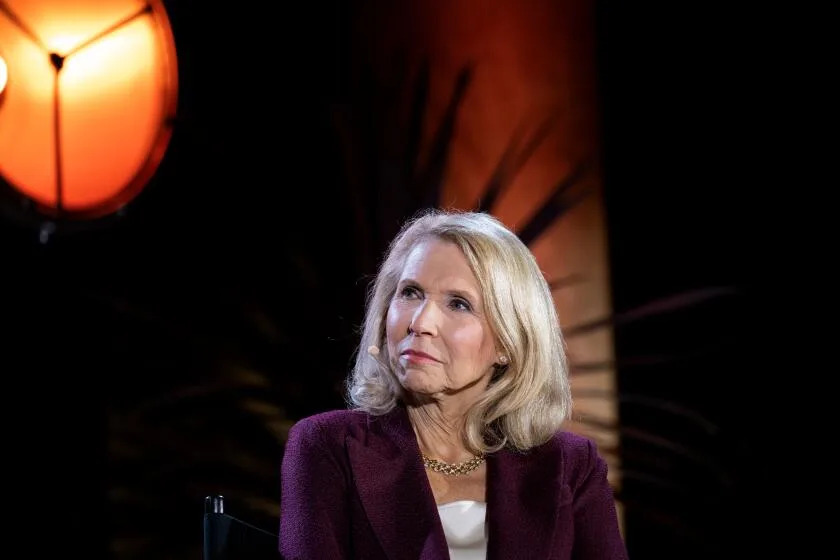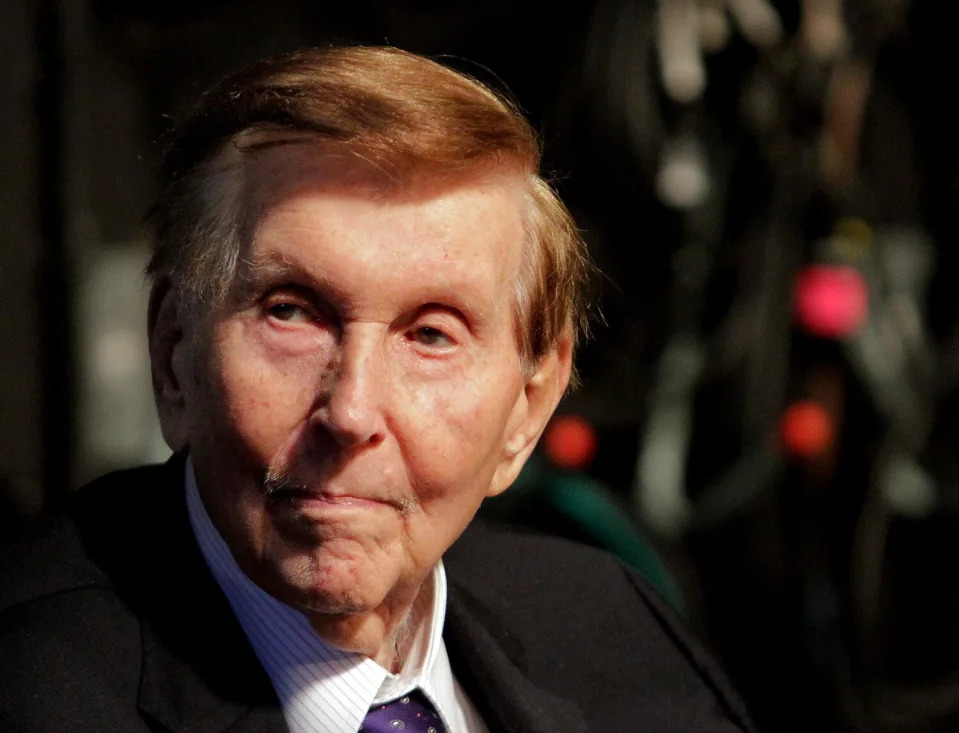Why Shari Redstone went cold on a Paramount sale to Skydance
For seven months, media mogul Shari Redstone agitated for Paramount Global's leaders to embrace her plan to hand the storied media company to tech scion David Ellison.
Paramount then-Chief Executive Bob Bakish and several board members resisted. Investors howled that the Ellison deal would give Redstone and her family a rich premium for their controlling Paramount shares — at the expense of regular shareholders. Undeterred, Redstone sacked Bakish, her longtime lieutenant, and four board members were shown the door.
By late Saturday, the Redstone family and Ellison's Skydance Media had agreed on major deal terms. Ellison — the son of tech billionaire Larry Ellison — was poised to capture his hard-fought prize. Paramount's weary workers checked their email, expecting a major announcement to land at any moment. Independent board directors scheduled a meeting for 11:30 a.m. Tuesday to formally consider the deal.
But just as the meeting got underway, Redstone called with stunning news.
The Skydance deal was dead.
Redstone's change of heart, after months of drama and tensions spilling into the public, was the culmination of several forces that had been playing out behind the scenes, according to seven people close to the situation who were not authorized to comment on internal discussions.
Redstone's adult children — who are in line to inherit the family's fortune — had initially advocated for the Skydance deal, according to two of the sources. But, by early this month, the matriarch was becoming increasingly uncomfortable.
On Monday, three sources said, Redstone and her children had agreed to hold on to their heirloom, abruptly ending one of the industry's most calamitous auctions.
"It's Shari's company," said one insider. "She had kicked and clawed for control, and she just wasn't ready to let go."
What prompted Redstone's reversal?
Read more: Paramount Global sale collapses after Shari Redstone pulls support for David Ellison deal
The 70-year-old mogul was unhappy with changes to deal terms that would have meant less money flowing to the family's holding company, National Amusements Inc., two sources said.
The family initially expected around $2 billion for NAI, which owns 77% of Paramount's voting shares. But the deal was restructured (with Redstone's buy-in) to provide more money to common shareholders, which would have left the family with about $1.7 billion after NAI's debt was paid, the knowledgeable people said.
Separately, Redstone wanted to be indemnified from costly shareholder lawsuits and give other shareholders the ability to weigh in. But that was a sticking point for Skydance.
And other suitors have emerged. In recent weeks, Redstone received overtures to sell just National Amusements and its controlling Paramount shares, which would represent a more straightforward transaction.
Former top Seagram and Warner Music executive Edgar Bronfman Jr. and Hollywood producer Steven Paul (“Ghost in the Shell,” “Baby Geniuses”) have separately expressed their desire to buy National Amusements. Both prospective bidders signaled they would pay more than the amount that National Amusements would have received under the Skydance bid.
The Redstones wanted to honor their late patriarch by not selling the family jewels at a low. They anticipate that a better offer for NAI will soon materialize, sources said.
The sale of Paramount would have marked the end of an era for the Redstone family, which has long cherished its position in Hollywood. And it was Shari Redstone who toiled for years on the sidelines of father Sumner Redstone's sprawling empire. The hard-driving late mogul and the high-level executives at his company, then known as Viacom, were dismissive of her talents and ambition.
But Shari Redstone hung in, and in 2016, as her father's health was failing, she led a sweeping corporate housecleaning.
Three years later, Redstone achieved her longtime goal of reuniting Viacom and broadcaster CBS. The combined company was renamed Paramount Global in 2022, but its stock has since cratered. Shareholders, including legendary investor Warren Buffett, bailed.
Read more: Shari Redstone was poised to make Paramount a Hollywood comeback story. What happened?
Bakish's ouster was key to the unfolding drama, sources said.
Redstone and Bakish had been struggling behind the scenes since November, knowledgeable people said. She had grown increasingly impatient with Paramount's sluggish stock performance and the downgrade of its credit to "junk" status. And she was furious over Paramount's May 2023 decision to cut its dividend to shareholders, according to three sources.
The dividend cut devastated the Redstones' company, NAI, which then turned to Chicago banker Byron Trott and his BDT Capital Partners for a $125-million cash infusion last year to pay creditors who were demanding money.
Bakish was fired April 29. In an unusual arrangement, the board installed three division heads — George Cheeks, the leader of CBS; Chris McCarthy, the cable entertainment chief; and Brian Robbins, the head of Paramount movie studio and Nickelodeon — as the "Office of the CEO." The trio immediately went to work to craft a business plan for Paramount that would satisfy Redstone and Wall Street.
After Paramount's June 4 shareholders' meeting, the three executives gave a private presentation that wowed Redstone and others on the board, people familiar with the matter said.
The company finally seemed to have a path forward on its own.
Read more: Bob Bakish is ousted as CEO of Paramount Global as internal struggles explode into public view
The three executives also developed a kinship with Redstone, who was newly reinvigorated over the challenge of restoring Paramount to greatness.
The CEOs' plan centers on $500 million in cost cuts — including an undisclosed number of layoffs — and selling assets, which analysts say could include cable channel BET and TV stations not affiliated with CBS. The group also said they would explore a joint venture for the company’s Paramount+ streaming service.
Talks last fall with Comcast over a streaming joint venture stalled because, at the time, Redstone was pursuing the Skydance deal.
"Their balance sheet is, in a word, unhealthy, and they need a cash infusion to improve the balance sheet, which means they need to sell the assets,” Bernstein & Co. media analyst Laurent Yoon said. "They have no other choice."
Another obstacle to a deal with Skydance was the Redstone family's worries that a regulatory review process could stretch 18 months, causing more instability for the struggling media company. The deal-making "was already taking forever," one insider said.
Read more: Paramount Global unveils business plan and job cuts as sale looms
There were other factors too. Paramount's lead independent director, Charles Phillips Jr., had long been opposed to the two-phase $8-billion transaction with Skydance. The Santa Monica production company, its investors RedBird Capital Partners and private equity firm KKR, along with Larry Ellison, were putting billions of dollars into the deal.
Phillips, a former president of Larry Ellison's Oracle Corp., left that software giant in 2010 on rocky terms. There's been speculation that Redstone is now eyeing Phillips for a bigger role.
"We continue to believe that Redstone/National Amusements is likely to appoint current Paramount board member and former Viacom board member, Charles Phillips, as CEO," industry analyst Richard Greenfield wrote in a note.
A person close to Redstone downplayed speculation, saying the mogul has deep respect for Phillips as well as for Cheeks, McCarthy and Robbins.
David Ellison, who has earned standing in Hollywood as a successful movie producer, had planned to install his own leadership group at Paramount, which would have left Robbins, the movie studio chief, particularly vulnerable, the sources said.
Read more: David Ellison's journey from trust fund kid to media mogul vying to buy Paramount
Executives in McCarthy's cable programming division also felt threatened, recognizing that their futures were uncertain because Skydance may have decided to sell cable channels to pay down debt. "Now, they live to fight another day," another insider said Wednesday.
The company could choose to weather a few years of pain as it pares itself down to a pure-play content company, analysts said.
Paramount shares closed Wednesday down 8 cents to $11.12.
The scuttled sale doesn't solve National Amusements' financial problems.
Read more: Her father once dismissed her as a lightweight. Now Shari Redstone will run the show at ViacomCBS
"We believe National Amusements is keen to sell Paramount eventually," Greenfield, the analyst, said. "We suspect the next 12-18 months is a 'pause' in the Paramount [merger and acquisition] process, not the end."
Times staff writer Samantha Masunaga contributed to this report.
This story originally appeared in Los Angeles Times.
Chaos at Paramount:
Alexei Barrionuevo
Tue, June 11, 2024
The future of Paramount was thrown into chaos on Tuesday after Shari Redstone scuttled a long-planned sale of the struggling entertainment company to Skydance Media, leaving a major Hollywood studio bobbing in uncertain waters.
Why did she do it? An individual close to the deal said Redstone communicated her decision to cancel the pending sale to Skydance on Tuesday morning — even before Paramount’s special committee was meant to meet on the matter.
Redstone’s concerns about her own legal liability and a dispute over whether to give both voting and non-voting shareholders a consent vote played deciding roles in the deal’s failure to launch, three individuals told TheWrap.
“She’s a lunatic,” said one individual close to the deal in the heat of the moment, reflecting the anger that rippled through the teams that had worked for months toward a close.
The upshot at the close of business on Tuesday was that Redstone had made a mess of her plan to sell Paramount and preserve the legacy of her father, Sumner Redstone, the former chairman of both Viacom and CBS who built Paramount Global from a legacy studio into an entertainment major rivaling Disney and Universal Studios.
The end of the Skydance deal
The decision by Redstone, Paramount’s non-executive chairwoman and controlling shareholder through her holding company National Amusements Inc. (NAI), ended months-long negotiations with David Ellison’s company, Skydance.
Paramount and Skydance negotiators agreed to financial terms last week that would have paid Redstone $2.25 billion for her stake in National Amusements, which controls 77% of Paramount’s voting stock. Paramount’s independent special committee was set to receive an update on the progress of a potential transaction on Tuesday.
Redstone, who had been trying to build an indemnification plan to shield herself from potential shareholder lawsuits, decided she still wasn’t satisfied and communicated her desire to end the talks to Skydance before the committee met, two people familiar with the deal told TheWrap.
“She made the decision,” one person said. “She just wants the most money for herself.”
Redstone “had to take a little bit less than she thought in that deal because they moved money over to the Paramount shareholders,” a second person said. (Skydance previously revised its offer to inject more cash and give minority shareholders a premium sweetner and the option of cashing out at $15 per share.)
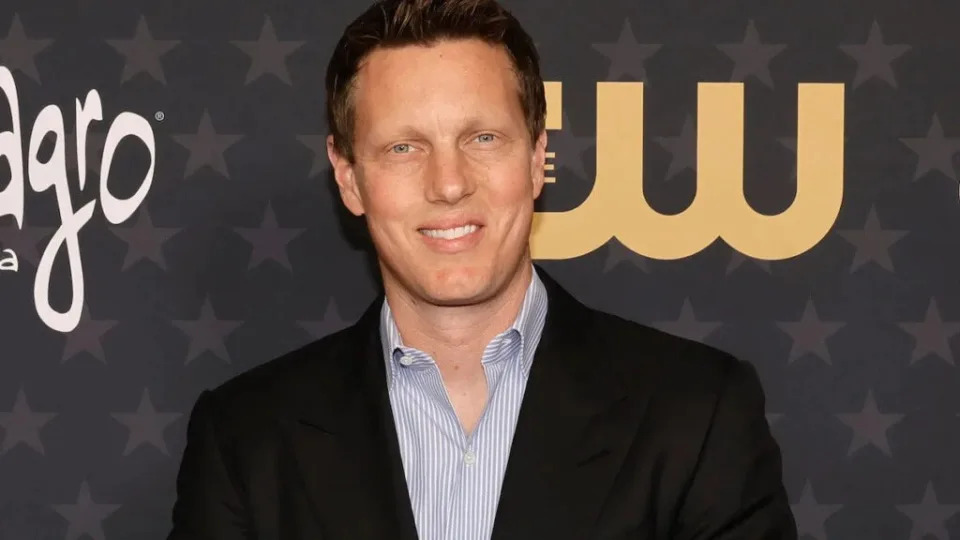
Skydance CEO David Ellison (Credit: Kevin Winter/Getty Images)
That person also noted that problems arose in the due diligence process. And two people noted that personal tension between Ellison and Redstone further contributed to the deal collapsing.
A third individual familiar with the negotiations said that Paramount’s independent special committee never officially recommended Skydance’s latest revised offer, contrary to previous reports. While both sides agreed to the economic terms, there were outstanding issues that they did not agree on. Most notably, Skydance would not agree to allow all shareholders a consent vote on the sale.
“Both the special committee and National Amusements wanted it to be part of the terms of the deal and Skydance did not,” the individual said.
The special committee confirmed in a statement Tuesday that it did not take a vote on the Skydance deal and had met for an update on the progress of the transaction. Subsequently, it was informed by National Amusements that the two parties weren’t in agreement and that they “didn’t anticipate a path forward” on the transaction.
Skydance was never the only bidder interested in Paramount. Private equity firm Apollo Global Management also teamed up with Sony Pictures Entertainment on a more lucrative $26 billion all-cash offer. And Allen Media Group founder Byron Allen placed a $30 billion bid including debt, though it was unclear how that would have been financed.
But Redstone stuck with Skydance, even as some of Paramount’s largest shareholders publicly decried the offer as favoring her own financial interests above theirs.
In the midst of negotiations, four Paramount board members opted to step down at the company’s annual meeting. Separately, longtime CEO Bob Bakish stepped down in April, leaving a three-headed Office of the CEO in charge. Paramount is currently facing $14.6 million in long-term debt, a credit downgrade to junk status, a declining linear television business and an unprofitable streaming business. Its stock is down 33% over the past year; it fell another 7.8% on Tuesday to close at $11.04.
Where Redstone goes from here
Now Redstone seems inclined to focus on either selling National Amusements or giving the Office of the CEO time to execute its long-term strategy rather than doing a deal for Paramount. Some analysts said Tuesday that they can understand why.
“A Skydance deal with Paramount raised a few eyebrows from the get-go,” Jamie Lumley, senior analyst at Third Bridge, said. “As it became increasingly clear that Skydance intended to sell off assets following a merger, it seems likely Shari Redstone wanted greater say over the ultimate home of the pieces of her media empire.”
Lumley added that the “convoluted nature” of the proposed merger might have spurred more legal challenges from Paramount’s common shareholders. The offer from Skydance, which was backed by a consortium of investors including RedBird Capital and KKR, involved Ellison acquiring National Amusements. In a second step, Skydance would have merged with Paramount to create a combined company.
Some shareholders expressed relief that Redstone decided to abandon the Skydance deal, while continuing to criticize her handling of Paramount’s sale. While the revised deal was better than the original for non-voting shareholders, “it was still sub-par and likely only worth $12.50 to $13 a share,” David Katz of Matrix Asset Advisors, a Paramount shareholder, said. Redstone and Paramount preferred shareholders “would have done well,” he said.
“Shari has shown her hand; she is solely out for herself,” Katz added.
New bidders
So far, two groups have shown interest in National Amusements.
“Baby Geniuses” producer Steven Paul has approached Redstone, an individual familiar with the matter told TheWrap. His bid is reportedly backed by a group of investors that includes John Paul DeJoria, the billionaire cofounder of Patrón tequila and Paul Mitchell hair care products, according to Bloomberg. Paul and DeJoria’s group, who are being advised by Rockefeller Capital Management, made an offer several weeks ago that is more than the $2.25 billion from Skydance but less than $3 billion, the outlet noted.
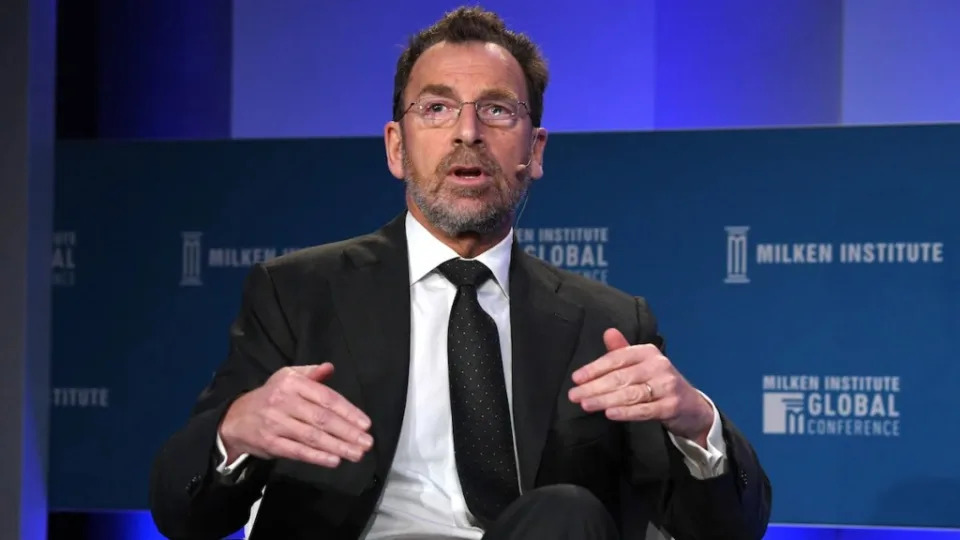
Edgar Bronfman, Jr. (Credit: Michael Kovac/Getty Images)
Separately, Bain Capital and Edgar Bronfman Jr., the former Warner Music Group CEO and chairman, are looking to offer between $2 billion and $2.5 billion for National Amusements, according to The Wall Street Journal. A formal bid from Bronfman would be subject to due diligence and approval from Bain’s own investment committee, the outlet reported.
One of the individuals familiar with negotiations said that selling NAI on its own is a “possibility” but emphasized that the expressions of interest from Paul and Bronfman Jr. are not as far along as the Skydance deal was.
A year to two years out “might be a radically different and better environment to sell the firm. This was a fire sale at the worst time,” Katz said. “There is new uncertainty in her selling National Amusements, to whom and what will their plan be. But in this case in all likelihood, the devil we don’t know is better than the devil we know.”
While Redstone mulls whether to explore a sale of National Amusements on its own, Paramount investors will be forced to consider the updated plan laid out at last week’s annual meeting by the senior executives comprising the Office of the CEO: Chris McCarthy (Showtime/ MTV Entertainment Studios and Paramount Media Networks), George Cheeks (CBS) and Brian Robbins (Paramount Pictures and Nickelodeon).
They have called for transforming Paramount’s still-unprofitable streaming business through strategic partnerships and licensing opportunities, trimming $500 million in costs and divesting assets to pay down debt.
On Tuesday, National Amusements expressed support for the Office of the CEO and the board “to explore opportunities to drive value creation for all Paramount shareholders.” It also said it was “grateful to Skydance for their months of work in pursuing this potential transaction and looks forward to the ongoing, successful production collaboration between Paramount and Skydance.”
The dance around Paramount has become exhausting — for Wall Street and the entertainment industry. And time is not on the company’s side. “Any plan, and any potential buyer of Paramount, will have to contend with a company whose mix of assets presents in many ways a challenged hand for navigating the shifting winds of media,” MoffettNathanson said in a research note.
Sharon Waxman contributed to this article.
Ariel Investments Founder Blasts Failed Skydance-Paramount Sale Process: ‘A Once in a Generation Kind of Screw Up’
Lucas Manfredi
Wed, June 12, 2024
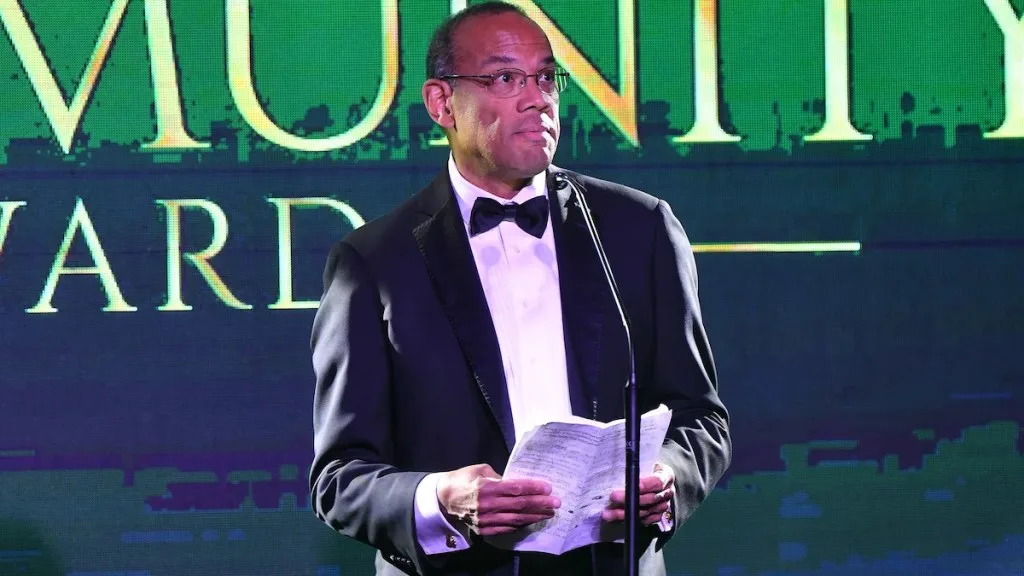
Ariel Investments co-founder John Rogers Jr. isn’t mincing words about the months-long drama surrounding Paramount Global, calling the scrapped deal between Shari Redstone’s National Amusements and David Ellison’s Skydance Media the “most screwed up sale and governance I’ve ever seen.”
“It’s just a once in a generation kind of screw up,” the executive, whose firm owns a 1.8% stake in Paramount, told TheWrap in an interview on Wednesday. “It just doesn’t make any sense. You have all these great assets, great IP, great history and they’ve found a way to destroy value. It’s just pretty extraordinary.”
On Tuesday, National Amusements informed a Paramount special committee evaluating bids that it was ending discussions with Skydance. Redstone’s company noted that the two parties were not in agreement and “didn’t anticipate a path forward” on a potential transaction. An individual familiar with negotiations told TheWrap that while the parties had agreed to the economic terms of a deal, there were outstanding issues not agreed upon, including whether to give both voting and non-voting shareholders a consent vote.
“NAI is grateful to Skydance for their months of work in pursuing this potential transaction and looks forward to the ongoing, successful production collaboration between Paramount and Skydance,” the company said in a statement.
The decision comes after Paramount, which has a market capitalization of $7.7 billion as of Wednesday afternoon, saw its stock price fall 15% in the past month, 27% in the past six months, 23% year to date and 33% in the past year.
It also faces $14.6 billion in long-term debt, a credit rating that’s been downgraded to junk status, a declining linear television business and an unprofitable streaming business.
In the midst of negotiations, four board members — including three who were on the special committee — stepped down at the company’s annual meeting last week. Longtime CEO Bob Bakish stepped down in April and was replaced by a three-headed Office of the CEO.
As the future of Paramount Global remains more uncertain than ever, Rogers Jr. believes the company should look to make a deal with Sony Pictures Entertainment and Apollo Global Management, who previously made a joint $26 billion all-cash offer, or a “similarly situated strategic or financial buyer.”
“After all that’s gone on, they just owe it to the shareholders to put us out of our misery,” Rogers said. “Enough is enough. There’s so much private equity money out there. There’s going to be so many mergers in this industry because of the challenges that we all know the industry faces, and if they wait five years from now, all of your options are going to be closed. All the pathways to success will be shutting down systematically over the next five to 10 years.”
Rogers added that small, independent media companies will “never be able to negotiate another NFL contract 10 years from now,” but “if you come together and you do creative things, you build a partnership and get deep pockets that are interested in this field, then you can have success based upon the wonderful set of assets that are there.”
Redstone also has the option of selling National Amusements on its own. She has received two separate expressions of interest, from former Warner Media Group chairman and CEO Edgar Bronfman Jr. and “Baby Geniuses” producer Steven Paul.
As Redstone mulls what to do next, Paramount will be run by top executives Brian Robbins, Chris McCarthy and George Cheeks. The trio laid out the broad strokes of a long-term strategic plan last week at the company’s annual meeting. Their plan includes streaming partnerships, $500 million in cost cuts and divesting assets. They plan to address employees at a town hall on June 25 and will lay out additional details of the plan to shareholders during the company’s second quarter earnings call in August.
NAI said it supports the Office of the CEO’s plan as well as their ongoing work with the company’s board of directors to “continue to explore opportunities to drive value creation for all Paramount shareholders.”
But Rogers argued that Paramount can’t operate in an “untenable situation” indefinitely and that Redstone has her own financial challenges to resolve with National Amusements. He hopes to have an opportunity to connect with the Office of the CEO going forward as they execute on their strategy.
“We had access to the prior leadership team and they were always straightforward with us and available,” he said. “So I would hope we could meet the new team.”

